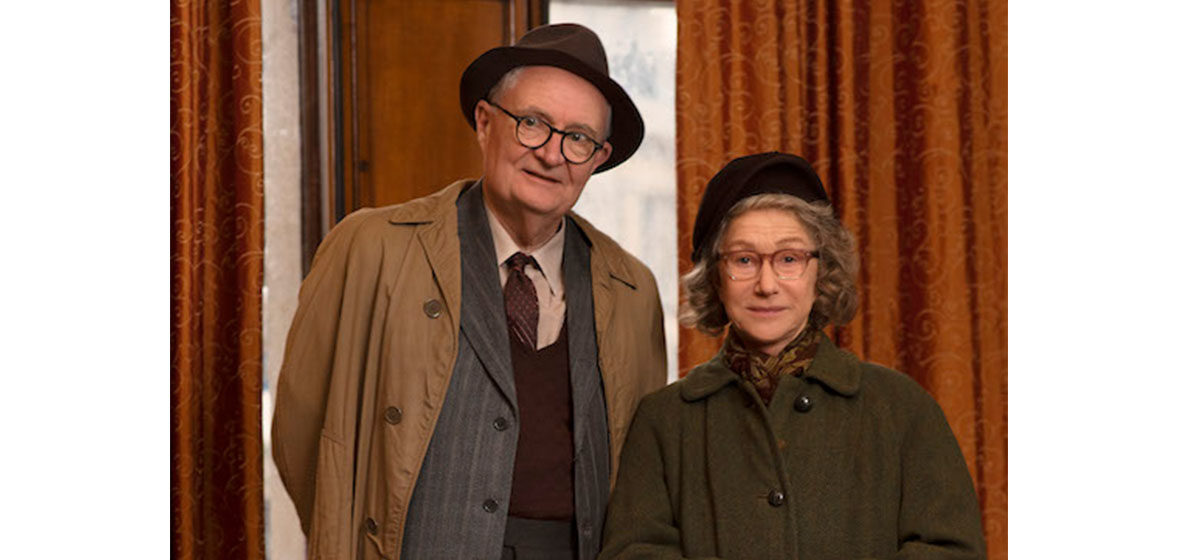Rating: ***
If there was ever a perfect film to celebrate the life of its director, one could do worse than The Duke. Roger Mitchell was a solid artist. He passed away last year before he could watch his final feature, delayed for more than a year because of the pandemic. He leaves behind a small but surprisingly consistent filmography of well-built, robust crowd-pleasers that survived the test of time. Notting Hill is his most successful film, but Venus was a delightful comedic take on the perks of growing old. I honestly never met someone who didn’t appreciate Le Week-End, and Changing Lanes was an odd change of genres for the director (a change of lanes, if you will) that was honestly ahead of its time when it came to high-concept adult thriller. Mitchell didn’t let his auteurship stand in the way of a good story; the visual efficacy of his style was a strength. Filmmaking without ego.
The reason why it’s essential to start this review with a bit of eulogy to Mitchell is two-fold. First, I admired his artistic modesty, and secondly, The Duke is, above all, a film about Mitchell himself and his efficient approach to art.
Based on a true story, it follows a quirky working-class Newcastle cab driver, Kempton Bunton (Jim Broadbent), who confessed to stealing a famous painting by Spanish romantic painter Francisco Goya from the National Gallery. Kempton is a jolly man with clear and concrete ideas of what he believes is fair. A DIY socialist, unbridled by party constraints, he stands up and fights for all he believes to be the right thing to do. This enchanting trait charms everyone but his boss at the cab company and his wife, Dorothy (Bunton), a dedicated woman who knows she must carry the family on her shoulders before her husband eventually gets sacked for defying authority.
The film starts with Kempton hounded by two agents for having a TV set and no TV license. The reasoning, Kempton says, is he tweaked his set, so it’s impossible to watch the BBC. Therefore, no license is necessary. It’s a cheeky and petty stand, but it’s the principle of the thing. Dorothy, of course, pays for the license herself because, for her, it’s the principle.
It’s here that Kempton finds his last grievance. In Macmillan’s England, where millions were struggling with high living costs, the government had just spent an inordinate amount of money to return Francisco Goya’s portrait to the Duke of Wellington to be on display at the National Art Gallery for a small price. After a quick trip to the capital to protest the TV license, Kempton takes a detour to bring the painting back with him to persuade the government – he will return the picture if they agree the elderly will be exempt from paying the TV license. Again, it’s the principle of it all.
In the second third of the film, Kempton tries to go on with his life, so his wife doesn’t find the hidden masterpiece in the wardrobe and seeing the notoriety of his actions take over the national dialogue. You’d think a government could accept such a simple and honestly fair request, but convincing politicians to do the right thing is more complicated than you think. Kempton is not a criminal, though, and while he can justify the means of his ends, guilt remains.
The third act, though, is utter joy. In it, Kempton gives himself in as the man who stole the painting and faces trial and prosecution for his crime. He’s helped and defended by the well-meaning barrister Hutchinson (Matthew Goode), who understands Kempton’s actions. Hutchinson knows they are fighting not to create a precedent, so the government doesn’t look weak, not because a painting was stolen.
In Mitchell’s tradition, the cast excels. Broadbent and Mirren have tremendous energy together, even though their characters are opposite each other. Mitchell knows how to give older actors the roles that still provide them with something new while at the same time looking so natural. Goode plays his best Gregory Peck as Atticus Finch, which may be a bit of a stretch, but I couldn’t help to think of him, after each day, sitting his little child on his lap to give them some grandiose life lesson he had learned from the wise and quirky working-class Geordie.
But the show is Mitchell, precisely because he works so hard not to be about him. It’s an excellent way to send him off. Nothing in it is particularly damaging nor exciting. It’s correct, all of it. The film tells the story of a simple working-class man who steals a famous painting so other people could have more rights. Because no class should be above fancy art, and no man should be above his vision. This one stands on the high-end of the three stars.
Would you like to watch The Duke? LSJ has 10 double-passes to giveaway. To enter, email your postal address and LawID, with the subject line THE DUKE to [email protected] by COB 7 April. Please check the terms and conditions here.




